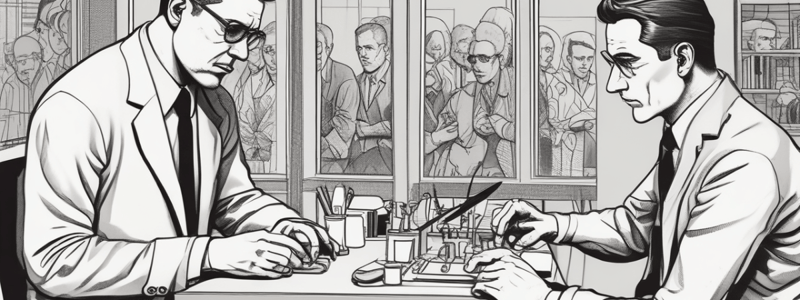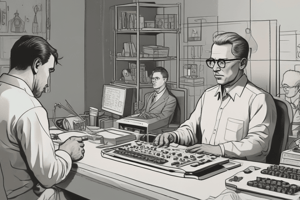Podcast
Questions and Answers
Why did the experimenter choose to continue shocking the learner even after the learner said 'let me out of here'?
Why did the experimenter choose to continue shocking the learner even after the learner said 'let me out of here'?
Why did the replication where the teacher puts the Learner's hand on the shock plate result in decreased obedience?
Why did the replication where the teacher puts the Learner's hand on the shock plate result in decreased obedience?
What concept from social psychology would best explain the decrease in obedience when the Learner states before the study begins that he'll only participate if let out when he wants to be?
What concept from social psychology would best explain the decrease in obedience when the Learner states before the study begins that he'll only participate if let out when he wants to be?
What effect did moving the study from Yale University to an abandoned office building have on obedience levels?
What effect did moving the study from Yale University to an abandoned office building have on obedience levels?
Signup and view all the answers
Why did having the Learner in the same room as the participant in a Milgram experiment lead to decreased obedience?
Why did having the Learner in the same room as the participant in a Milgram experiment lead to decreased obedience?
Signup and view all the answers
In the study, why did obedience decrease when the experimenter gave instructions over the telephone instead of in person?
In the study, why did obedience decrease when the experimenter gave instructions over the telephone instead of in person?
Signup and view all the answers
What impact did having two teachers, one of whom was a confederate who wouldn't obey, have on obedience levels?
What impact did having two teachers, one of whom was a confederate who wouldn't obey, have on obedience levels?
Signup and view all the answers
Which additional reason, not mentioned in the textbook, contributed to people obeying in Milgram's original study?
Which additional reason, not mentioned in the textbook, contributed to people obeying in Milgram's original study?
Signup and view all the answers
How did allowing teachers to select the shock level for each incorrect answer impact obedience?
How did allowing teachers to select the shock level for each incorrect answer impact obedience?
Signup and view all the answers
In the context of the Milgram experiment replications, why did less ability to rationalize and self-justify behavior lead to decreased obedience?
In the context of the Milgram experiment replications, why did less ability to rationalize and self-justify behavior lead to decreased obedience?
Signup and view all the answers
Why did obedience decrease when participants had less ability to rationalize and self-justify their behavior?
Why did obedience decrease when participants had less ability to rationalize and self-justify their behavior?
Signup and view all the answers
Which concept best explains why the replication involving having the Learner in the same room as the participant resulted in decreased obedience?
Which concept best explains why the replication involving having the Learner in the same room as the participant resulted in decreased obedience?
Signup and view all the answers
What was the percentage of trick-or-treaters who stole extra money or candy when in groups, according to Diener et al. (1976)?
What was the percentage of trick-or-treaters who stole extra money or candy when in groups, according to Diener et al. (1976)?
Signup and view all the answers
In the study by Beaman et al. (1979), what environmental factor reduced the amount of candy stolen by trick-or-treaters?
In the study by Beaman et al. (1979), what environmental factor reduced the amount of candy stolen by trick-or-treaters?
Signup and view all the answers
Which of the following is NOT a consequence of deindividuation?
Which of the following is NOT a consequence of deindividuation?
Signup and view all the answers
What defines a group based on the text?
What defines a group based on the text?
Signup and view all the answers
Why do groups sometimes perform worse than individuals according to the text?
Why do groups sometimes perform worse than individuals according to the text?
Signup and view all the answers
How can Group Polarization be addressed?
How can Group Polarization be addressed?
Signup and view all the answers
What is a potential mechanism of Group Polarization?
What is a potential mechanism of Group Polarization?
Signup and view all the answers
In what situations do individuals perform better in complex tasks according to Social Facilitation vs. Social Loafing?
In what situations do individuals perform better in complex tasks according to Social Facilitation vs. Social Loafing?
Signup and view all the answers
What is a characteristic of Groupthink that may lead to poor decision-making?
What is a characteristic of Groupthink that may lead to poor decision-making?
Signup and view all the answers
What can enhance groups' productivity according to the text?
What can enhance groups' productivity according to the text?
Signup and view all the answers
Which factor contributes to making Complex Tasks 'Bad' in the context of Social Facilitation vs. Social Loafing?
Which factor contributes to making Complex Tasks 'Bad' in the context of Social Facilitation vs. Social Loafing?
Signup and view all the answers




